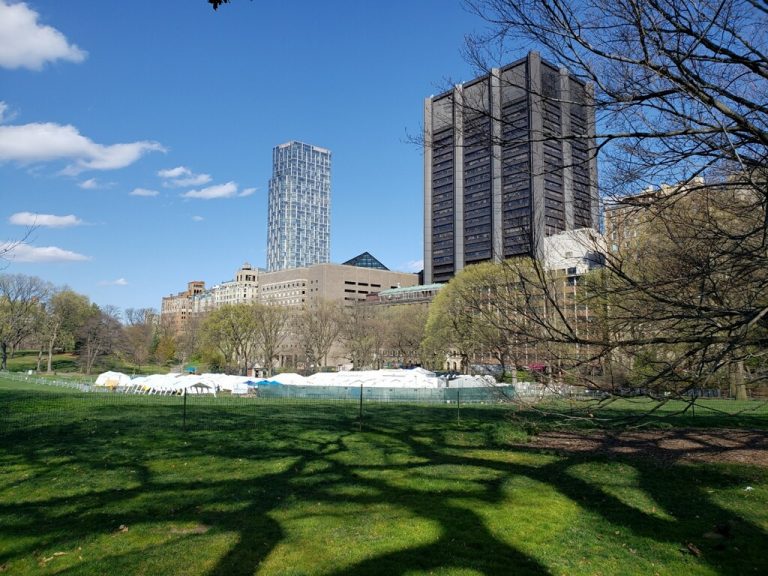White field hospital tents in Central Park. Personal protective equipment including shields,
gloves, masks and lab coats. Body bags loaded onto trucks.
This is the everyday reality for doctors in New York City, the epicenter of America’s COVID-19
outbreak, including for Dr. Natasha Kyprianou.
Kyprianou is a professor in the Departments of Urology and Oncological Sciences at the Icahn
School of Medicine, Mount Sinai Hospital. She is not an emergency response doctor; rather, she
is a researcher at the Tisch Cancer Institute specializing in cancers of the kidneys, prostate and
bladder.
In the heart of the city, she and her team have been on the front lines, using their cancer expertise
to find solutions to possibly help cure current COVID-19 patients.
“For us, although we’re not in the ICU, we are in the middle of the battlefield. The biggest
change is the conversion of the cafeteria and the major entrance to the hospital to ICU units,”
Kyprianou said. “We do try to minimize walking through those areas and of course, wear
personal protective equipment in terms of shields, gloves, lab coats, masks and coveralls.”
Death is an inevitable experience and an everyday occurrence in medicine, but the numbers of
the COVID-19 pandemic deaths are disturbingly high, reports Kyprianou.
“This is going to sound morbid, but one of the most sobering realizations is that these patients are
dying with no relatives around them, just the nurse taking care of them,” Kyprianou said. “Last
week one evening when I was going home I saw on the other side of the Hess Center, there were
four containers—people were loading body bags of patients who have died to either burn them or
take them to an undisclosed location.”
Of all the everyday pandemic horrors, it’s the field hospital in Central Park across from
Kyprianou’s home that reflects the gravity of the situation.
“The Good Samaritan field hospital is right across from my residence. So when I am walking to
work, I see it. The most dramatic feeling is that you’re in the middle of a war zone. The white
tents give you the impression that these are wounded soldiers that are being taken care of.”
New York City reached its peak death rate last week, with its numbers reaching about 800 deaths
per day.
“When there are 800 people dying for ten days—a very large number of people dying in one day
by one disease, even for New York City—it’s important to be aware,” said Dr. Kyprianou. “This
is no time to not follow the rules. We’re talking about human lives here.”
Though New York City may still feel grim, the city reached a plateau with about 560 cases at
the beginning of the week.
“The number of cases have been declining,” said Kyprianou. “We have 16,000 tests since the
beginning that have been done. The positivity varies between 50-70%. Right now with the new
serological tests, it’s much higher. The number of patients released have been increasing
dramatically.”
Kyprianou’s colleagues at Mount Sinai in the Department of Microbiology have been responsible
for the development of the brand-new serological test, which tests patients for COVID-19 at a
higher accuracy rate. Though she’s been indirectly involved, Kyprianou has also been
researching virus treatment.
“As cancer researchers though, we haven’t put that research on hold,” said Kyprianou. “We’ve
noticed there are certain things that are shared between cancer and COVID-19 patients … A
common denominator between COVID-19 and prostate cancer at the cellular level is a gene that
is controlled by androgens. We have this theory that androgens … are facilitating the infection
rate of COVID-19. Since we have a series of anti-androgen drugs—already FDA approved—that
we are using for patients with advanced prostate cancer, maybe we can use some of them in
patients with COVID-19.”
Currently, their study addresses cancer patients with COVID-19 and how the anti-androgen
drug plays out against the virus.
“We’re looking at some of our cancer patients who also have COVID-19, and if they were treated
with anti-androgens. If they are taking these anti-androgens, what is their release time from the
hospital compared with patients who have never been exposed to anti-androgen drugs?”
As of now, there are no known treatments to COVID-19 that work effectively. Kyprianou
emphasized the difficulty of using hydroxychloroquine as a COVID-19 treatment option.
“Hydroxychloroquine is an inhibitor of apoptosis, or the ability of a cell to induce its own death,”
said. Dr. Kyprianou, “So when you’re using hydroxychloroquine there are tremendous side
effects. I know because some cancer patients use it. There are times during homeostasis where
that’s important, but when you’re blocking the normal process of apoptosis, there are lots of side
effects in the brain, the liver, the kidneys and the heart.”
Though treatment possibilities are still up in the air, cases are slowly declining by the day. After
over a month of fighting all hours of the day and night, a respite is on the horizon. With that,
though, a post-coronavirus world is emerging.
“The world will not be the same,” Kyprianou said. “There’s going to be a new norm for all of us.
The theaters will open and the restaurants will be open, but there won’t be a lot of parties or large
gatherings for a while. We have to get used to that. We need to practice loving others. We’ll
come out as better human beings.”



